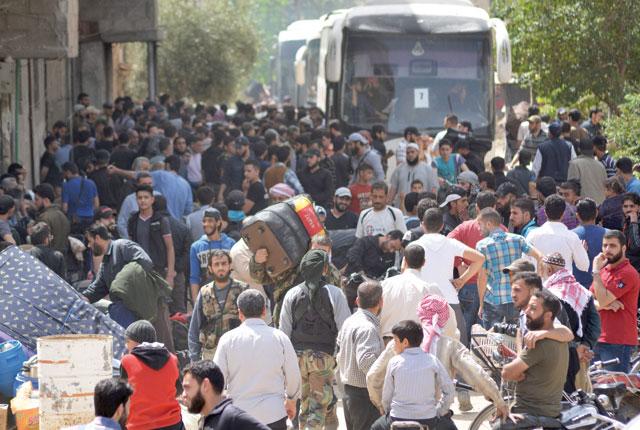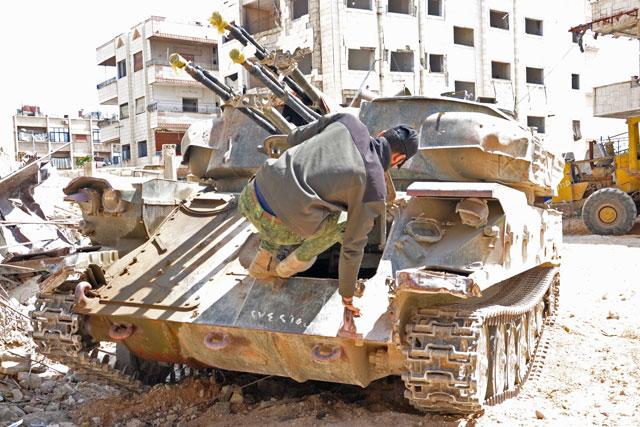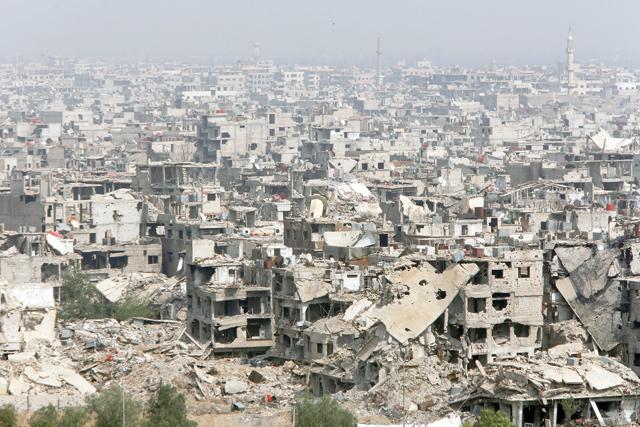You are here
Rebels evacuating Syria last besieged enclave
By Agencies - May 08,2018 - Last updated at May 08,2018
AMMAN — Hundreds of rebels left the last major besieged opposition enclave in Syria on Monday, with thousands more expected to follow, responding to months of pressure by a Russian-backed government offensive, the army, rebels and residents said.
A first convoy of buses with hundreds of rebels and their families, accompanied by Russian military police, departed from the city of Rastan, starting a week-long evacuation from towns and villages in an enclave between the cities of Homs and Hama, Reuters News Agency reported.
Rebels representing several major Free Syrian Army (FSA) factions capitulated to a Russian-imposed deal after marathon talks with Russian generals on May 2 in Dar al Kabira town in the northern Homs countryside.
The deal forced them to hand in heavy weapons and gave those rebels not ready to make peace with the army the option of leaving with light arms to rebel-held areas in northern Syria. Draft dodgers would have a six-month reprieve.
Russia exerted pressure by pounding the main towns of the enclave, where over 300,000 inhabitants live, in an escalation that killed and wounded dozens, rebels and residents said.
The Russians closed a border crossing near a key road to prevent civilians fleeing, to raise pressure on mainstream rebels to accept the terms, rebels and residents said.
Fears that Russia and its Syrian ally would unleash an even tougher push, on the scale that ended rebel control of Aleppo in 2016 and Eastern Ghouta last month, prompted the capitulation to spare civilian lives, residents and civilian negotiators said.
“They left rebels with no option after bombing civilians and giving them no choice either to submit or obliterate their areas and make civilians pay the price,” said Abul Aziz Al Barazi, one of the civilian opposition negotiators told Reuters.
The war has been going President Bashar Assad’s way since Russia intervened on his side in 2015. From holding less than a fifth of Syria in 2015, Assad has recovered to control the largest chunk of the country with Russian and Iranian help.
A major bombing campaign that began last February ended the last remaining pockets of opposition resistance in the Eastern Ghouta, the biggest enclave around the capital, that had for years withstood a siege and successive army onslaughts.
The fall of the once heavily defended Ghouta demoralised rebels in others areas further east of the capital closer to the Iraqi border and in a southern Damascus pocket.
Now the only besieged area left is a small enclave in southern Damascus, where a few hundred Daesh militants are making a last stand as aerial strikes devastate the once teeming major Palestinian camp of Yarmouk, Syria’s largest, and nearby Hajar Al Aswad town.
More than 30 Syrian government troops have been killed in a fierce counteroffensive by Daesh group fighters, a monitor said on Monday, as reported by Agence France-Presse.
Regime troops control 60 per cent of Hajar Al Aswad, while Daesh still holds more than 80 per cent of Yarmouk.
Last week, troops managed to sever a route linking the two areas, the Syrian Observatory for Human Rights monitor said, but Daesh launched a fightback at the weekend and successfully reopened it.
“Their hit-and-run operations have continued since then, killing a total of 31 regime forces, mostly in ambushes,” said Rami Abdel Rahman, head of the Britain-based observatory.
“The regime has since been advancing slowly, taking some positions and buildings, but there hasn’t been any strategic advance since Saturday,” he told AFP.
Forces loyal to President Bashar Assad were pounding both districts with air strikes and shelling on Monday, Abdel Rahman said.
Since the start of the offensive in mid-April, more than 150 regime forces have been killed, as well as 120 Daesh fighters, the observatory said.
Another 47 civilians also died in the fighting.
The last batch of rebels in the remaining south Damascus pockets, which includes the towns of Babila, Yalda and Beit Sahem, are expected to leave in the course of this week.
The Homs and Hama rebel enclave deal leaves the mainly Sunni civilians unprotected, leaving many residents there afraid of revenge by militias from surrounding Alawite villages.
Accordingly rebels in the enclave say that under the agreement they have gained assurances that the Russian military police would spread out and man checkpoints around the enclave for a renewable six-month period. The rebels see the move as a guarantee against the entry of paramilitary pro-Assad militias.
Related Articles
BEIRUT, Lebanon — Syrian rebels began pulling out of an enclave they have surrendered in south Damascus on Thursday, but a few fighters in a
BEIRUT/LONDON — Air strikes pounded an extremist-held area near Damascus on Sunday, footage broadcast by Syrian state TV stations showed, as
BEIRUT, Lebanon — The Syrian army and its allies engaged in a fierce battle on Saturday with Daesh fighters in an enclave south of Damascus



















